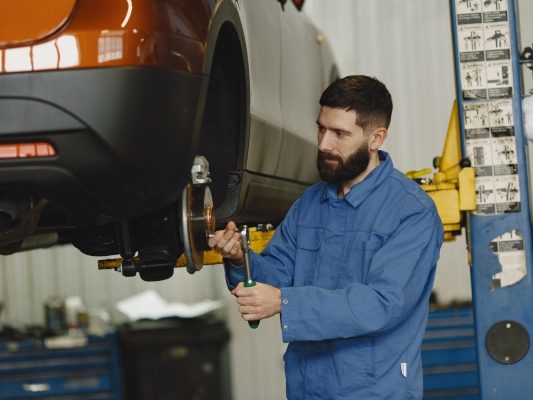Your vehicle’s braking system is one of its most critical components, ensuring safety and control on the road. However, brake failure can occur due to various reasons, potentially leading to dangerous situations. In this blog, we will explore the top five common causes of brake failure, offering insights to help you stay informed and maintain your vehicle’s brakes efficiently.
1. Worn-Out Brake Pads
Brake pads are essential for generating the friction needed to stop your vehicle. Over time, they wear down due to regular use. When brake pads become too thin, they lose their ability to grip the rotors effectively, reducing stopping power. This can lead to delayed braking or, in severe cases, brake failure.
Signs of worn-out brake pads:
-
Squealing or grinding noises when braking.
-
Increased stopping distance.
-
Vibration or pulsation in the brake pedal.
Tip: Regularly check your brake pads for wear and replace them as recommended by your car’s manufacturer. If you’re unsure, consulting a brake specialist is always a wise choice.
2. Brake Fluid Issues
Brake fluid plays a vital role in transferring force from the brake pedal to the brake components. Low or contaminated brake fluid can lead to a spongy brake pedal or complete loss of braking power. Brake fluid contamination often occurs due to moisture buildup, which can cause the fluid to boil and reduce its effectiveness.
Signs of brake fluid issues:
-
Soft or spongy brake pedal.
-
Illuminated brake warning light.
-
Difficulty stopping the car.
Tip: Regularly check your brake fluid levels and have the system flushed and refilled as part of routine maintenance. A trusted mobile brake repair service can conveniently address these issues at your location.
3. Overheated Brakes
Overheating occurs when brakes are used excessively, such as during long downhill drives or frequent stop-and-go traffic. High temperatures reduce the friction between the brake pads and rotors, causing brake fade and, eventually, failure.
Signs of overheated brakes:
-
Burning smell from the brakes.
-
Reduced braking efficiency.
-
Brake pedal feels unusually hard.
Tip: Use engine braking when driving downhill to reduce the load on your brakes. If overheating becomes frequent, consult a mobile autocare service to inspect your braking system.
4. Faulty Brake Lines
Brake lines deliver hydraulic fluid to the brake components. Damage or corrosion to these lines can cause fluid leaks, reducing hydraulic pressure and leading to brake failure. This is especially common in older vehicles or those driven in harsh conditions.
Signs of faulty brake lines:
-
Visible fluid leaks under the car.
-
Brake warning light on the dashboard.
-
Reduced brake responsiveness.
Tip: Regular inspections by a car mechanic mobile service can identify and fix brake line issues before they escalate, ensuring your brakes remain reliable.
5. Malfunctioning Master Cylinder
The master cylinder is the heart of your car’s braking system, generating the hydraulic pressure needed for braking. If the master cylinder fails, it can lead to a complete loss of braking power.
Signs of a failing master cylinder:
-
Brake pedal sinks to the floor.
-
Contaminated brake fluid.
-
Reduced braking effectiveness.
Tip: A professional mechanic or mobile brake service can diagnose and repair master cylinder issues to restore your car’s braking performance.
Preventing Brake Failures: Essential Maintenance Tips
To ensure your brakes remain in top condition, follow these maintenance practices:
-
Regular Inspections: Schedule periodic brake checks with a brake specialist to catch wear and tear early.
-
Replace Worn Components: Don’t delay replacing brake pads, rotors, or other parts when needed.
-
Monitor Fluid Levels: Check your brake fluid regularly and ensure it’s clean and at the correct level.
-
Drive Smart: Avoid aggressive braking and use engine braking when possible to reduce stress on the system.
When to Call for Help
If you experience brake issues while on the road, don’t take chances. Call for car roadside assistance or a trusted mobile autocare service. These professionals can provide immediate help, ensuring your safety and getting your vehicle back on the road.
For example, a car mechanic mobile service can address urgent brake problems, such as replacing worn-out pads or repairing brake lines, without requiring a trip to the shop. This convenience saves time and offers peace of mind.
Conclusion
Brake failure is a serious issue that demands attention. By understanding the common causes and taking proactive steps, you can ensure your brakes function reliably. Regular maintenance, careful driving habits, and timely intervention from professionals like a car mechanic mobile service can keep you safe on the road.
If your car’s brakes need attention, don’t hesitate to consult a brake specialist or call for car roadside assistance to address the problem promptly. Your safety is worth it!












